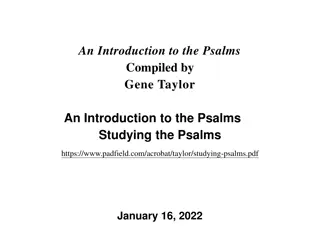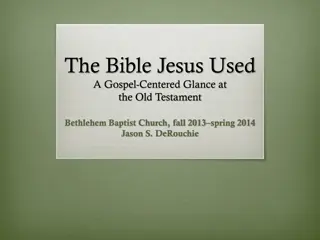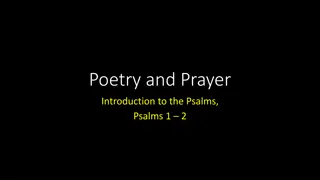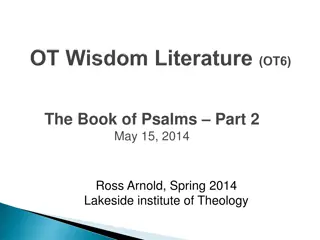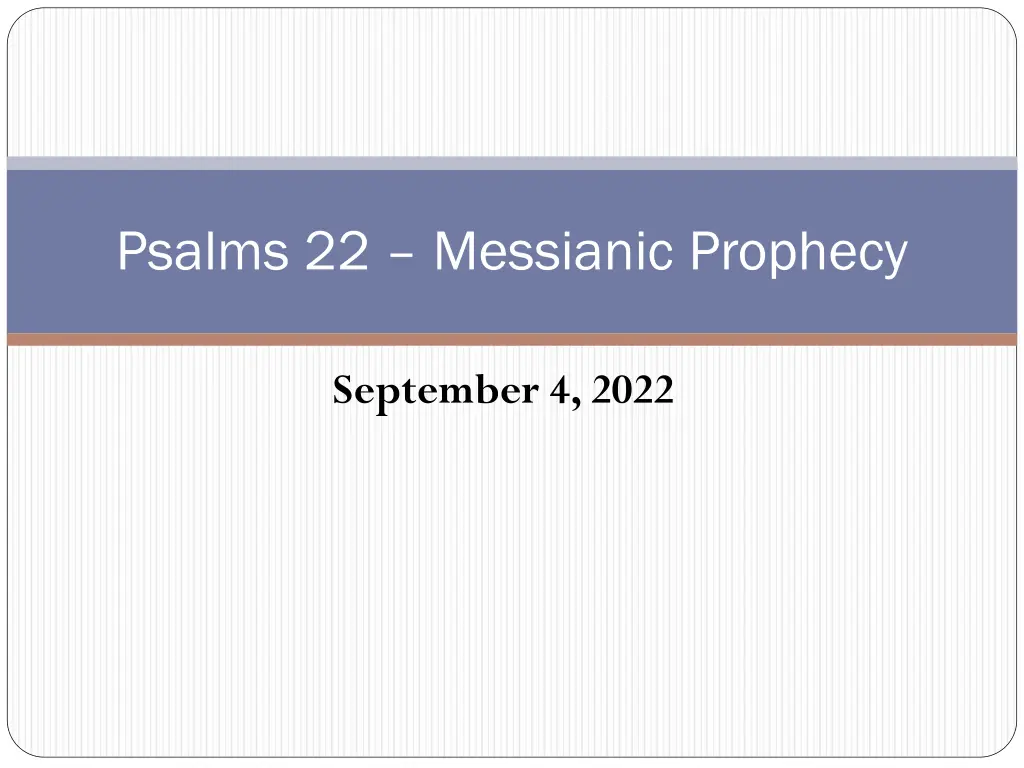
Understanding Psalms 22: Messianic Prophecy and Christ's Sufferings
Explore the significant references in Psalms 22 to the sufferings of Christ and the contrasting views on whether it solely relates to David or the future Messiah. Delve into the concept of Jesus feeling forsaken and the theological implications of His sacrifice.
Download Presentation

Please find below an Image/Link to download the presentation.
The content on the website is provided AS IS for your information and personal use only. It may not be sold, licensed, or shared on other websites without obtaining consent from the author. If you encounter any issues during the download, it is possible that the publisher has removed the file from their server.
You are allowed to download the files provided on this website for personal or commercial use, subject to the condition that they are used lawfully. All files are the property of their respective owners.
The content on the website is provided AS IS for your information and personal use only. It may not be sold, licensed, or shared on other websites without obtaining consent from the author.
E N D
Presentation Transcript
Psalms 22 Messianic Prophecy September 4, 2022
Introduction: Introduction: Does this psalm refer to the Christ or not? Hebrews 2:12 quotes Psalms 22:22 and applies it to the sufferings of Christ. Note how many points are indirectly quoted or referred to in the New Testament when Jesus is in the midst of His suffering in arrest, trial, and crucifixion. Does Psalms 22 refer at all to David himself or strictly to the coming Messiah? David is called a prophet by Peter (Acts 2:30) and may not be speaking about himself at all, but only prophesying of the Messiah to come. Note: None of the information we read in this psalm can be found historically as events in David s life. But these events can be found in the suffering of the Christ. Note: Contrast between what appears and what is known.
Suffering, Yet Calling For Deliverance Suffering, Yet Calling For Deliverance Jesus quoted Psalms 22:1-2 in Matthew 27:46; Mark 15:34. Was Jesus literally forsaken? (cf. Isaiah 54:7-10). Forsake: transitive verb; to renounce or turn away from entirely. (Webster) `azab (aw-zab'); a primitive root; to loosen, i.e. relinquish, permit, etc. (New Exhaustive Strong s Numbers and Concordance with Expanded Greek-Hebrew Dictionary.) He may leave us without help for a small moment, but in his good pleasure, help will ultimately come. The help that the Son sought did indeed come to him (verses 21, 24). (Evan and Marie Blackmore, Psalms I, Truth Commentaries, page 280)
Suffering, Yet Calling For Deliverance Suffering, Yet Calling For Deliverance Jesus quoted Psalms 22:1-2 in Matthew 27:46; Mark 15:34. Was Jesus literally forsaken? 1. The consequence of the position is not very attractive. Jesus came to do the will of the Father, which involved His suffering and death on the cross (Hebrews 10:5-10). Jesus carried out the Father s will with absolute perfection. John 8:29, And he that sent me is with me; he hath not left me alone; for I do always the things that are pleasing to him. Did God forsake one who was always pleasing the Father? John 16:32, Behold, the hour cometh, yea, is come, that ye shall be scattered, every man to his own, and shall leave me alone: and (yet) I am not alone, because the Father is with me.
Suffering, Yet Calling For Deliverance Suffering, Yet Calling For Deliverance Jesus quoted Psalms 22:1-2 in Matthew 27:46; Mark 15:34. Was Jesus literally forsaken? 2. Paying the price for our sins did not necessitate spiritual separation of the Father and the Son. He was simply paying a price of redemption (Matthew 20:28; 1 Timothy 2:6), spiritual separation was not necessary. No individual s sins can separate any other person from God (Ezekiel 18:4-32). Jesus did not endure: a. Temporary separation. We ve already suffered that. If this is the sacrifice made by Jesus, then we have already paid the price. b. Eternal separation. Jesus is in heaven (Colossians 3:1). But if He died separated from the Father, how could He have gone to Paradise (Luke 23:43)?
Suffering, Yet Calling For Deliverance Suffering, Yet Calling For Deliverance Jesus quoted Psalms 22:1-2 in Matthew 27:46; Mark 15:34. Was Jesus literally forsaken? The price paid by Jesus, was the blood shed by Jesus as a sin- offering. Jesus is the lamb slain before the foundation of the world (Revelation 13:8). It is with His precious blood that we are redeemed (1 Peter 1:18-19). It is through the shedding of that blood that we are forgiven (Ephesians 1:7). This is how Jesus was made to be sin (2 Corinthians 5:21), and that He became a curse (Galatians 3:13) for us.
Suffering, Yet Calling For Deliverance Suffering, Yet Calling For Deliverance Jesus quoted Psalms 22:1-2 in Matthew 27:46; Mark 15:34. Was Jesus literally forsaken? The price paid by Jesus, was the blood shed by Jesus as a sin-offering. He was not literally sin, but He was made a sin-offering. Jesus did not become guilty of the sins any more than the animals involved in the Old Testament sacrifices became literally guilty. The shedding of the blood became the means of forgiveness and the way by which the wrath of God was appeased. In contrast to the animals, Jesus came to do the will of God. Hebrews 10:10, By which will we have been sanctified through the offering of the body of Jesus Christ once for all.
Suffering, Yet Calling For Deliverance Suffering, Yet Calling For Deliverance What is meant by the phrase: My God, My God, why have You forsaken Me? (NASV) By quoting the first line of Psalms 22, Jesus was appropriating the message of the psalm to Himself. The psalm can be broken down into two major parts: 1. Forsaken by God (verses 1-21) 2. Delivered by God (verses 22-31) The psalm begins with this desperate phrase quoted by Jesus, but as it proceeds it expresses a victorious assurance of deliverance!
















